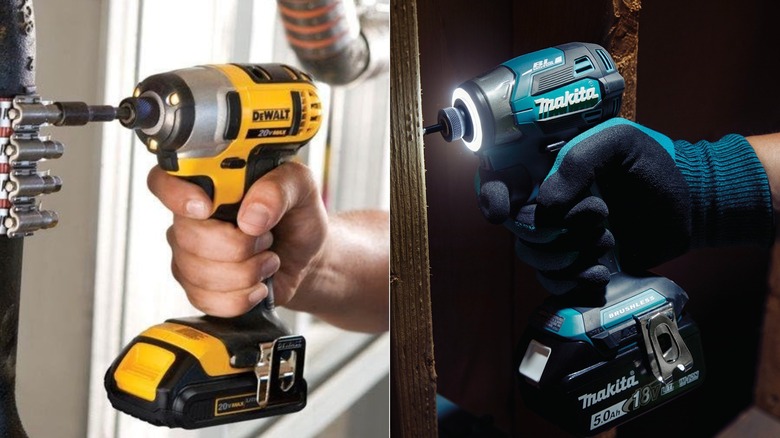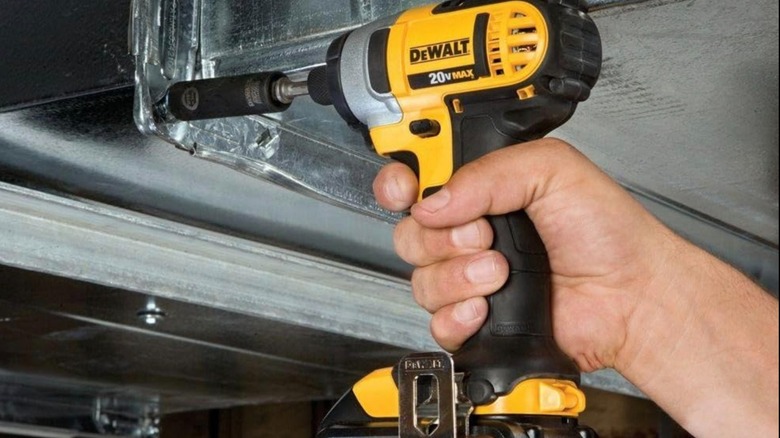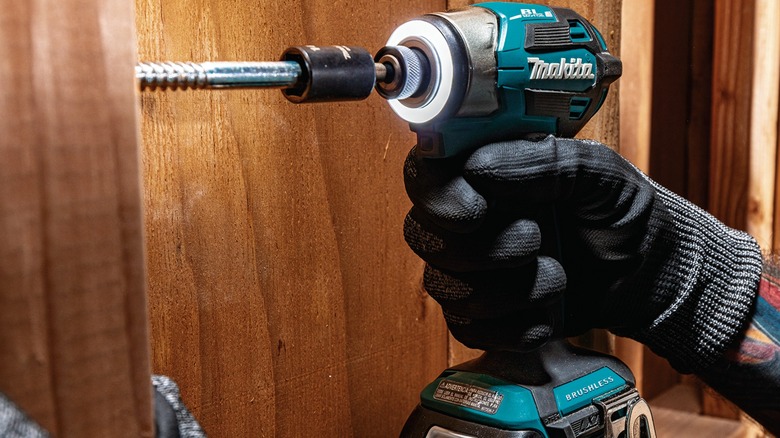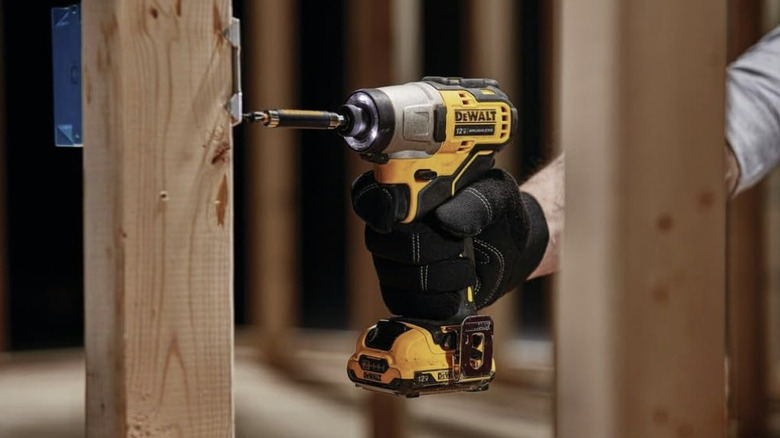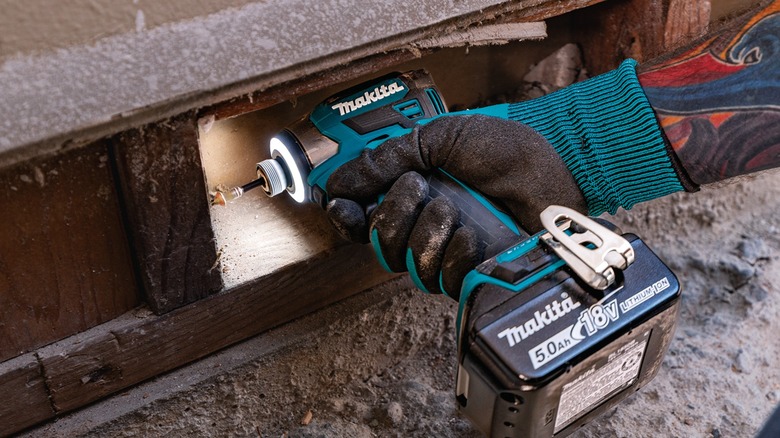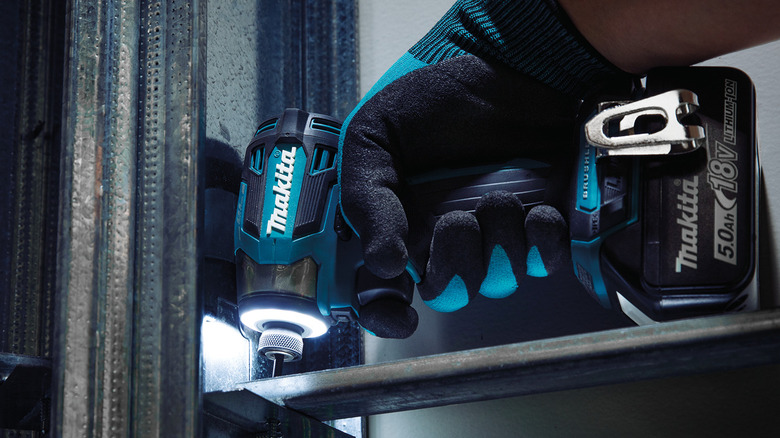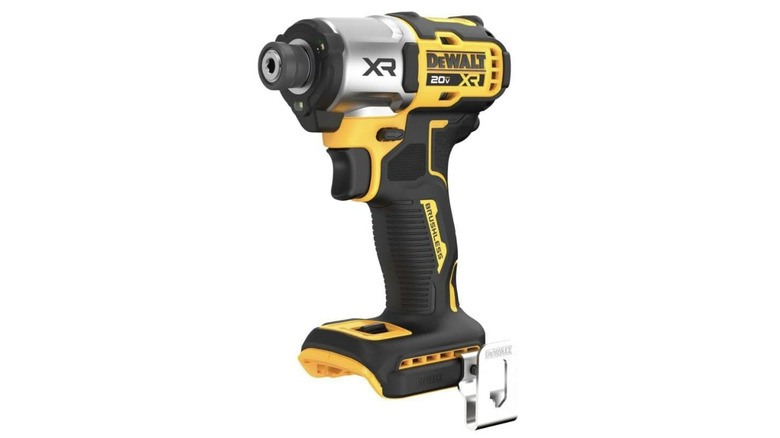Makita Vs. DeWalt: Who Sells The Better Impact Driver? Here's What Users Say
We may receive a commission on purchases made from links.
A power drill is one of the essential items you need in your home tool kit, but for heavier-duty tasks, you'll want to have an impact driver on hand. One of the main differences between a drill and an impact driver is the additional impact force, measured in impacts per minute, that the latter provides in addition to rotational torque. Because force is so important for an impact driver and its actual usefulness, it's one power tool you won't want to skimp on.
You'll want an impact driver that's reliable and, ideally, comes from one of the best major impact driver brands with solid reputations. On SlashGear's list of every major power tool ranked worst to best, Makita sits on top in the number one slot, with DeWalt just under it at number two. While Makita may have the overall edge, both brands are close enough in quality that there are some tools where DeWalt might make the better product, which begs the question: who makes the better impact driver?
While it may seem like a fairly simple question, it's a bit complicated to answer. For one thing, both Makita and DeWalt make several different models of impact drivers. Not only do the brands have multiple generations of impact drivers, with slight improvements made on newer iterations, but there are also impact drivers with different levels of torque and impact performance, and ones with different functions such as hybrid drill/drivers and right-angle options. Then there are ones with brushed motors and those that are brushless, and impact drivers that utilize different battery systems within each brand's lineup. To take a more detailed look at Makita impact drivers vs. DeWalt impact drivers, here's what users who've actually operated them have to say.
Users call DeWalt's impact driver robust and Makita's a beast
One of the things that Makita's and DeWalt's impact drivers have in common is that users are happy with both tools' performance — very few negative reviews for either brand concern the power and torque delivered by the devices. Multiple Amazon reviews of the Makita 18V LXT Brushless Impact Driver specifically highlight its power compared to its smaller size, praising how much torque it can provide for such a compact tool. This particular model can deliver up to 1,500 in-lbs of max torque and up to 3,600 impacts per minute, and in their positive reviews of the tool, Amazon users use descriptors like "monster of an impact driver" and "absolute beast of an impact." About Makita, another reviewer says, "These folks aren't playing around. Great impact!!!!"
DeWalt has a similar tool — the 20V Max XR Impact Driver — with the same 3,400 rpm capacity as the aforementioned Makita model. It's very well-liked on Amazon, with an impressive 4.7 out of five overall customer score, based on over 11,500 user ratings. Interestingly, though, you won't find the same dramatic descriptors of its power that Makita's tool has. Instead of being called a monster or beast, DeWalt's impact driver instead has more reserved — but still encouraging — feedback, such as users who cite its "robust performance" and multiple reviews saying the tool offers "plenty of power."
Makita's impact driver appears to have a slight edge when it comes to functionality
Power and performance are two of the most important factors for an impact driver, because of how much they relate to the tool's actual utility. It's no surprise then that users praise the functionality of both tools. Makita's 18V LXT XDT13Z model has zero negative reviews and 99 positive ones that specifically refer to its functionality, with users saying it "works great" on bolts and tek screws. One reviewer who calls the XDT13Z "hard to beat" states that they "love the usefulness of this uncomplicated little impact driver," and that — while newer generations are available — they'll continue to use the older model because the "simple little brushless unit just keeps on working."
Similarly, users of DeWalt's 20V Max XR Impact Driver are appreciative of the tool's functionality. Users say that it performs well on screws and "will do any job" asked of it. Other reviews say more simply that the impact driver "works good," "works great," and "works really well." While most reviews concerning functionality are generally positive, there are a free dozen negative ones — which Makita's impact driver has so far avoided. More than one of these negative reviews mention that, while the tool is "probably good enough for general carpentry," it struggles with automotive demands, including removing lug nuts.
Despite this, users generally appreciate the build of DeWalt's drivers, using words like "tough and dependable" to describe the Atomic ¼-inch model and saying it's made to"typical DeWalt quality" standards. Here again, Makita's products receive near-identical praise, which makes sense given both brands' reputations. Customers highlight the "quality feel" of the Makita XDT19Z Impact Driver and describe it as "very well built."
Users appreciate the battery life of most, but not all models
Both Makita and DeWalt offer impact drivers in more than one battery system. Most of the cordless models from each brand are in the 18V-20V range (DeWalt's 20V is more of a marketing term, as its system's nominal voltage is 18V.) However, DeWalt makes a compact impact driver as part of its more portable, less powerful 12V line of cordless tools. Despite the smaller battery, users agree that the DeWalt 12V Max Impact Driver has solid battery life and will last long enough on a single charge to be useful. Various customer reviews report things like that the tool offers "plenty of power" and that the "battery life and power are excellent."
Makita also offers a 12V Impact Driver, though Home Depot customers seem to have mixed opinions on its battery life and battery quality. One user who called the tool "powerful" claims that a 12V battery would last more than four hours powering the tool, while another called it a "small powerhouse of a tool." Meanwhile, other customers mention that the 12V batteries drain quickly, while at least one user openly questioned if the battery that came with the drill was faulty because it wouldn't charge.
Users are more universally in favor of Makita's 18V models when it comes to battery life, though. An older-generation model — the Makita 18V LXT XDT11Z — has many positive reviews that praise the battery life and charging speed of the tool, with one customer saying that Makita's 18V power packs "last pretty much forever and only take 20ish minutes to recharge!" Similarly, DeWalt customers appreciate the fast charging speed of the DeWalt 20V Max ¼-inch driver and battery life of models like the Atomic variant.
Both brands make impact drivers that are too heavy and not particularly ergonomic
It's clear that customers are fans of both brands' build quality, but another important factor for power tools is how comfortable they are to use — especially if you work with them often. While the Makita 18V LXT High-Torque ½-inch Impact Driver is highly rated in nearly all categories, more than one user raises complaints about its weight, describing it as "not particularly lightweight." One review says "it's heavy and with repeated use you will need to take breaks in between. Because of the weight, I found myself accidentally hitting the drive button while trying to remove nuts."
However, some Makita models — such as the XDT11Z — are commended for being lightweight, which can "reduce fatigue" for some users. Similarly, DeWalt's 20V Max DCF900P1 model has some negative reviews concerning its "fairly hefty" weight that is "too heavy" for some users, while a few models — like the ¼-inch DCF787D1 — seem to be the exception. This particular tool has a handful of positive reviews about its weight and zero negative ones, with users calling it "super light" and "great to carry around."
Tool brands like Makita and DeWalt typically like to point out the comfortable, ergonomic feel of its tools when marketing them. Not only does this make them less unpleasant to use, but it's important for giving you a firmer grip and more control over a tool. After combing through the reviews of over a dozen different Makita and DeWalt impact drivers, it's clear that users don't have many — if any — positive feelings for the comfort and controlled grips of either brand's tools. When it comes to who sells the more ergonomic, better-designed impact driver, it's a tie — but for last place, not first.
Makita edges out DeWalt when it comes to additional features
With so many different kinds of impact drivers to choose from for either brand, an important consideration to make is the different features offered by a particular model. Variable-speed impact drivers, for example, offer more versatility since you can use a single tool for a variety of different fastening tasks. The Makita 18V LXT XDT13Z ranges from zero to 3,600 impacts per minute. One user says the tool is "easy to control with the variable speed trigger" while another says the feature "is all I need." While DeWalt offers the same ability with most of its tools, users don't appear to single out the feature in reviews of DeWalt's drivers, though there is positive feedback concerning the maximum speed available.
The Makita Right-Angle Impact Driver has strong customer reviews, with many focused on how useful the tool is at working in awkward, tight spaces. You won't find similar reviews for DeWalt, because the brand doesn't offer an angle impact driver — though it does sell an Impact-Ready Right Angle Attachment with an impressive customer score.
Another well-liked feature is integrated LED lights to better see where you're working. While it's not mentioned as frequently as factors like build quality and power, some users go out of their way to say they appreciate the feature — at least one customer even says they "love the dual LED lights" on the Makita XDT16Z. DeWalt also has impact drivers with LED lights, as well as some positive user reviews mentioning that the LED lights are bright. However, at least one customer says the LED lights conked out on them within three months. Overall, Makita edges out DeWalt when it comes to positive user reviews for special features like LEDs and right-angle applications.
Customers find both brands to be worth the investment
For many of us, the cost of a tool is just as important a factor as its quality and functionality. When checking customer feedback for power tools, you'll want to keep an eye out for what they have to say about value — especially since they've already put their money where their mouths are. Broadly speaking, customers don't regret investing in Makita's impact drivers. The Makita 18V LXT XDT14Z has several positive reviews that focus on value, saying the tool is "the best bang for your buck" and offers "the best value I've ever felt with any of the tools I've purchased. Makita knocked it out of the park with this one. Definitely recommend."
While Makita has no shortage of praise for the value of its impact drivers, this is one advantage it can't claim to hold over DeWalt. Users generally seem to find that DeWalt's impact drivers live up to their cost and are worth investing in. For example, there are several positive reviews that single out the value of the DeWalt Atomic 20V Max ¼-inch Impact Driver, saying it is "well worth the cost" and that "for the price it really is an outstanding product." Another user says that this model will "cost a little more than the standard driver, but [is] worth it!"
Based on customer reviews, users are big fans of both Makita and DeWalt impact drivers and find them to be valuable tools. Which brand is better for you may come down to which batteries you already own, or possibly which special features are most important to you. If you're really torn, Makita may edge out DeWalt based on user reviews for functionality, considering how important that quality is for any tool.
